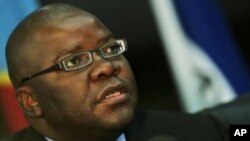Zimbabwean Finance Minister Tendai Biti has said that the Harare government ran a deficit of US$34 million in January, which he called unsustainable, noting that payments to public employees soaked up 70 percent of revenues of US$168 million.
After meeting the cost of public salaries and related items, the government was left with just US$51 million to meet other costs, Biti told Parliament.
Biti demanded greater transparency in the diamond sector, saying he has instructed the auditor general to look into anomalies in revenues from the Marange field from which the state received just US$62 million this year, a small share of estimated revenues.
Economist Daniel Ndlela said more state revenue must be extracted from Marange. “Lack of transparency in this sector is of major concern to Zimbabweans who believe that diamonds can revive the economy,” Ndlela told VOA reporter Gibbs Dube.
Despite Biti's comments on the large share of revenues consumed by salaries, Zimbabwe Teachers Association Chief Executive Sifiso Ndlovu said state workers will press ahead with demands for higher salaries the government has long said it cannot meet.
Ndlovu said public worker representatives will soon meeti President Robert Mugabe to discuss negotiations with state officials over salaries, which have stalled.
“We know that the government is facing difficulties in sourcing money for our salary increases but this will not stop us from demanding what is due to us and meeting the president to expresss our grievances,” Ndlovu said.
In other economic news, the Zimbabwe National Statistical Agency said inflation picked up to a 12-month rate of 3.3 percent in January from 3.2 percent in December, mainly due to higher costs of transport - due to rising fuel prices - and food.
Economist Luxon Zembe, chairman of a National Chamber of Commerce advisory council, told Jonga Kandemiiri that political violence is also boosting prices due to the political risk premium which foreign vendors have assigned to the country.





